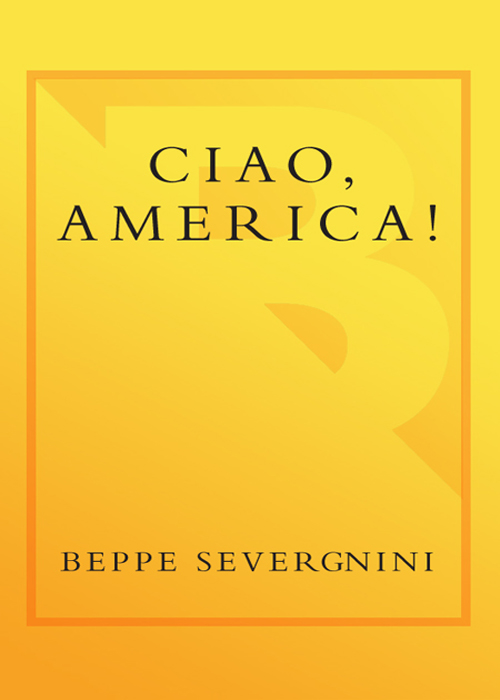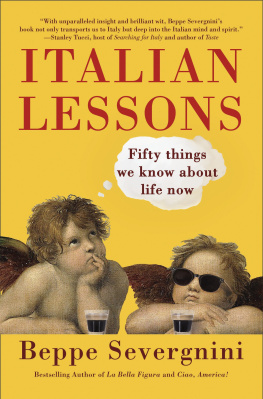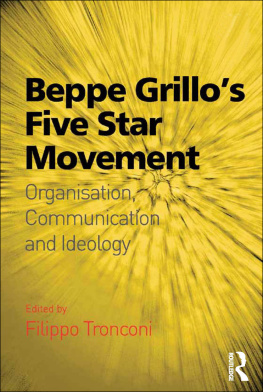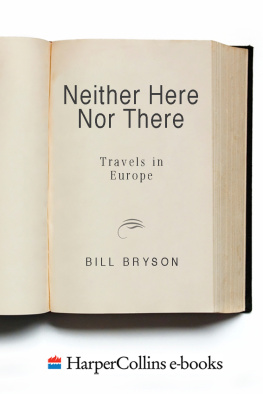
Ciao, America!
An Italian Discovers the U.S.
BEPPE SEVERGNINI
Translated by Giles Watson
BROADWAY BOOKS
New York
Contents
To Antonio
Introduction
It seemed to me that only in such a peaceful, slightly old-fashioned place could one catch America unawares and find out what Americans were really like.
LUIGI BARZINI, O America!
Italians who come to America arrive with an Italian head.
GIUSEPPE PREZZOLINI,
America in pantofole
THIS BOOK IS the product of prolonged inexperience. Its the story of a year spent in the United States, a country, as I came to realize, that you are completely unprepared for when you arrive. Everything I had learned in the course of many previous visits was no help at all. The American news we are bombarded with in Europe is like having a searchlight shine directly into your eyes: theres plenty of light but you cant see anything. Ordinary Americathe country you enter as you come out of the airport, unless youre particularly unfortunateis one of the worlds best-kept secrets.
I have understood the most important things about this countrythat is if Ive understood anything at alljust by sitting tight and watching. There is, I was fascinated to find out, an America that goes wild about ice, that thinks discretionary tips are mandatory, that worships at the shrine of air-conditioning, and performs arcane rituals in honor of the fiendish god of the easy chair. Its an America of strange noises, strong flavors, and faint smells. That everyday America, in my view, is crucial. But few have attempted to explain how it works.
I am offering the reader a chance to explore it with me. I spent twelve months, from one spring to the next, in a small house in Georgetown, an old neighborhood where Washington turns into a normal city. Its the right place to ask your first questions (why dont they turn the air-conditioning down?) and get those first all-important answers (because thats the way they like it). Georgetown is the ideal setting in which to join battle with a plumber called Marx, to be ambushed by a seriously laconic mailperson and to be besieged by thoughtful neighbors.
Some readers may remember that in previous books I have stalked Italians abroad, spied on Eastern Europeans, and subjected the British to scrutiny. Well, it wasnt easy going from Britain, where hot means lukewarm, to America, where the same word means incandescent. And experiencing at firsthand the local sense of humor was equally traumatic. In the USA there is no such thing as understatement. If you say Im not very good in Great Britain, it really means Im fantastic. If Americans are good at something (work, sport, sex), they come right out and tell you.
Most of the surprises were pleasant ones, though. I found out that children run things around here and that death is considered optional. I tried my hand at computer shopping, I got lost in car parks, I fought tooth and nail (failing) to acquire a credit card. I celebrated the Fourth of July. I chased a possum through my shrubbery. And I discussed politics with a neighbor called Greg. I realized why people care about neon, that soother of American angst, and I investigated the local passion for gadgets, which should not be underestimated. In its search to perfect the pocket-sized and portable, this country has covered a lot of ground.
As I was rereading this book, I became aware that my vision of America had come gradually into focus. The stupor of the early months gave way to a certain number of conclusions (right or wrongIll let you be the judge of that). I decided to keep that sense of progressive discovery because I think it is the attitude many Italiansindeed, many Europeanshave toward the United States. Naturally, some of my compatriots get off the plane convinced that they know everything, but theyre a minority (the same minority that knows all there is to know about politics, football, and wine). But most are happy to watch, learn, and comment (as soon as they find anyone willing to listen).
There is one thing Id like to say to them: the discovery of Americawhich is as complicated today as it was in 1492doesnt depend on how many miles you drive, or the number of states youve been to. America reveals itself in the little things. And to discover them, you need the inquisitiveness of a new arrival and the patience of a beachcomber, one of those mildly inappropriate individuals who roam the shores in search of small treasures. The seashore is America. The mildly inappropriate individual is me. Wish me luck, and lets get combing.
Washington, April 1995
April
Our house is made of white wood and faces west. The black-painted door has a fan carved above it and the shutters of the three windows are nailed back in case some prudish European should think of closing them at night.
At the back, hidden from the street, is a garden with an ivy-covered lawn. In the midst of the ivy, like a mermaid rising from the waves, is a concrete cupid. The owners may have hoped that Washington winters would make it look antique, but if that was the case, they are going to have to wait a little longer. For the time being, the concrete cupid still looks like a cupid made of concrete and continues to pour imaginary water from a concrete jug while staring in open hostility at the world round aboutsquirrels, blackbirds, and the occasional Italian tenant.
The house is on Thirty-fourth Street, which runs one way downhill through Georgetown. Actually, Thirty-fourth Street itself is a curious thoroughfare. Its only busy from four to six in the afternoon, when the massed office staffs of Washington descend toward M Street and cross the Potomac over Key Bridge on their way home to the immaculate suburbs of North Virginia. For the remaining twenty-two hours of the day, Thirty-fourth Street is a quiet road of brightly painted houses where people call each other by their first names and pretend that Georgetown is still the sleepy village that used to make a living from the tobacco trade at the time of the Revolution.
Apart from a certain number of lawyers, who in America are practically ubiquitous, our stretch of Thirty-fourth Street, from Volta Place to P Street, boasts an allergy specialist, a clerk at the World Bank, the daughter of a former CIA agent, a senator from Montana, and five exquisitely polite students from New England, whom I have unsuccessfully encouraged to behave like John Belushi in the film Animal House. Dave, their spokesperson, gently hinted that it would be undignified for a young American to humor a foreigners fantasies.
Georgetown is known officially as West Washington, a name that is used by no one. It extends over one square mile and has had a checkered history. When there is a Democrat in the White House (Kennedy, Carter, Clinton), its stock rises, only to fall when the Republicans move in (Nixon, Reagan, Bush). Conservatives prefer the quiet of the suburbs to the Bohemian lifestyle of the center. In the western part of Georgetown, near the river Potomac, lies the university, founded by Jesuits in the eighteenth century. To the east, beyond the lights of Wisconsin Avenue, the houses are larger and older. In the center are the dwellings that once belonged to artisans or traders. We live in the center.
These cramped, dark houses with their steep staircases are about as un-American as you could possibly imagine. A farmer from Oklahoma might use one for keeping poultry. In fact, Washingtons propertied classes do exactly the same thing, only their chickens come from the far side of the Atlantic. Yes, we Europeans love houses like these to distraction. In a detached suburban house, we might risk feeling we were actually living in America but the tiny rooms and woodworm-riddled floors of Georgetown serve to cushion the blow of moving from the Old World. We are prepared to pay a premium for inconvenience of this caliber. The agencies know it and take full advantage.
Next page





